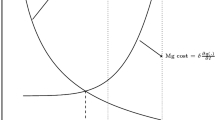Abstract
In this paper we analyze the impact of campaign contribution limits on government expenditures. The theory is based on the proclivity of geographic-based legislators to support wealth transfers from the polity at large to finance benefits for local constituents. It predicts that laissez-faire in contributions will lead to less government spending on budgetary redistribution and to a greater output of laws by the legislature. The theory is tested using data on U.S. State governments.
Similar content being viewed by others
References
Council of State Governments. (1980). Book of the States, Vol. 23. Lexington, KY.
Easterbrook, F.H. (1983). Antitrust and the economics of federalism. Journal of Law and Economics 26 (April): 23–50.
Glants, J., Abramowitz, A., and Burkhart, M. (1976). Election outcomes: Whose money matters? Journal of Politics 38: 1033–1038.
Jacobson, G. (1976). Practical consequences of campaign finance reform: An incumbent protection act? Public Policy 24 (Winter): 1–32.
Jacobson, G. (1978). The effects of campaign spending in congressional elections. American Political Science Review 72: 469–491.
Jacobson, G. (1980). Money in congressional elections. New Haven. Yale University Press.
Jacobson, G. (1985). Money and votes reconsidered: Congressional elections, 1972–1982. Public Choice 47: 7–62.
McLure, C.E. (1967). Tax exporting in the United States: Estimates for 1962. National Tax Journal 20 (March): 49–77.
Maloney, M.T., McCormick, R.E., and Tollison, R.D. (1984). Economic regulation, competitive governments, and specialized resources. Journal of Law and Economics 27 (October): 329–338.
Peltzman, S. (1971). Pricing in public enterprises. Journal of Law and Economics 14 (October): 109–148.
Peltzman, S. (1976). Toward a more general theory of regulation. Journal of Law and Economics 19 (August): 211–240.
Peltzman, S. (1984). Constituent interest and congressional voting. Journal of Law and Economics 27 (April): 181–210.
Silberman, J., and Yochua, G. (1978). The role of money in determining election outcomes. Social Science Quarterly 58: 671–682.
Thomas, S. (1986). Do incumbent campaign expenditures matter? Unpublished manuscript. Department of Economics, UC Irvine.
Welch, W.P. (1981). Money and votes: A simultaneous equation model. Public Choice 36 (2): 209–234.
Zardkoohi, A. (1977). The economics of public enterprise. Unpublished Ph.D. dissertation. VPI&SU, Blacksburg, VA.
Author information
Authors and Affiliations
Additional information
We are grateful to Kevin Grier, James C. Miller III, William Miller, Dennis C. Mueller, and Scott Thomas for helpful discussions. The usual caveat applies.
Rights and permissions
About this article
Cite this article
Crain, W.M., Tollison, R.D. & Leavens, D.R. Laissez-faire in campaign finance. Public Choice 56, 201–212 (1988). https://doi.org/10.1007/BF00130271
Issue Date:
DOI: https://doi.org/10.1007/BF00130271




